Moral Reasoning Experiment: Affect and Cognitive Load Analysis
VerifiedAdded on 2020/12/10
|12
|2935
|136
Report
AI Summary
This report presents a study on moral reasoning, investigating the influence of deontology and utilitarianism on individual judgment. The research employs SPSS software to analyze the effects of affect and cognitive load on moral decision-making. The study involved 60 participants and utilized descriptive statistics, t-tests, and chi-square tests to examine the relationship between these variables. The results indicate that cognitive load manipulation interferes with utilitarian judgments, and that negative affect conditions lead to fewer positive responses. The study also explores the role of cognitive reflection and its correlation with utilitarian judgments, highlighting the impact of reaction time and decision-making processes. The findings suggest that while cognitive load can affect decision-making, participants' awareness of situations can lead them to push through the load. The report concludes by discussing the implications of these findings on moral psychology and ethical decision-making.
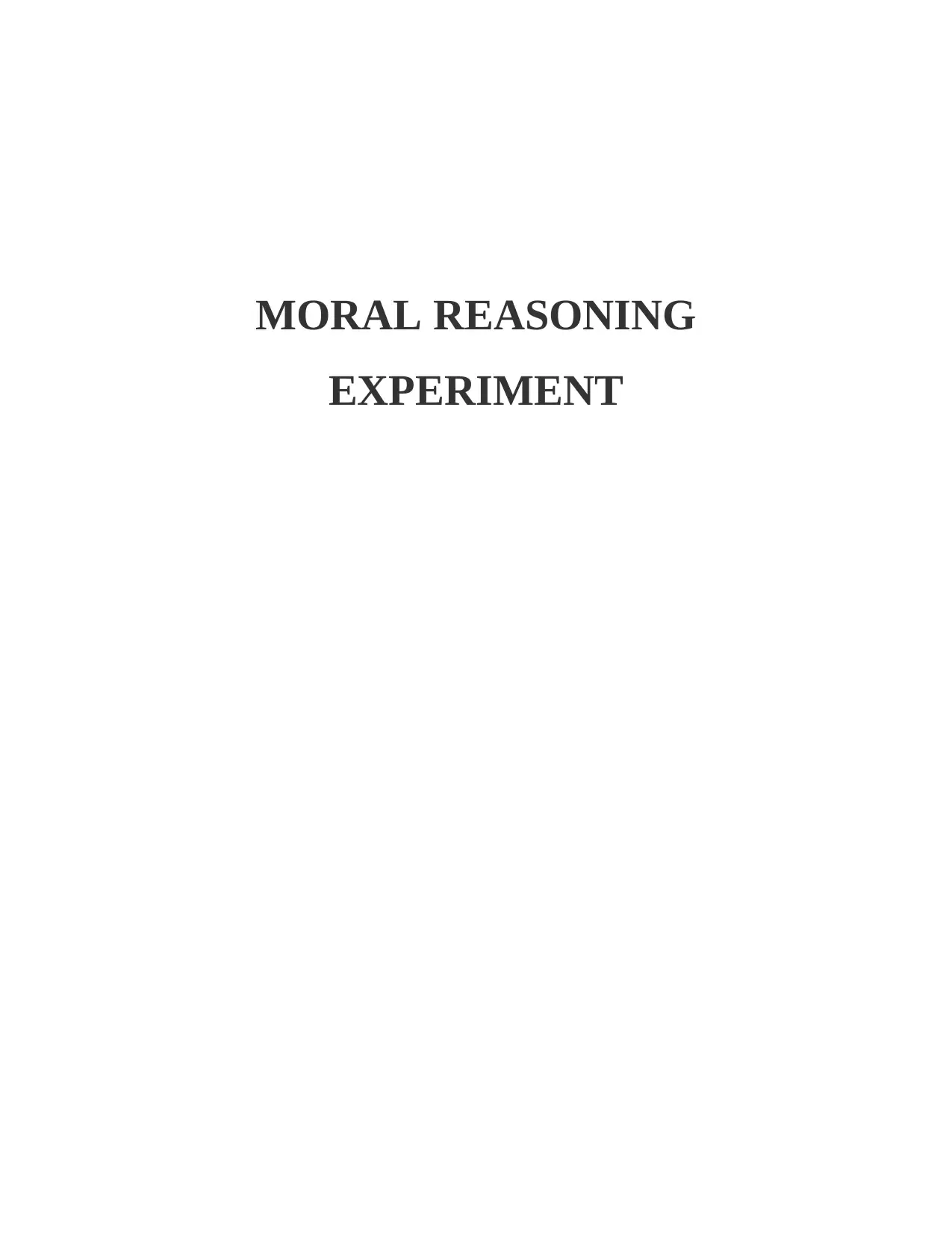
MORAL REASONING
EXPERIMENT
EXPERIMENT
Paraphrase This Document
Need a fresh take? Get an instant paraphrase of this document with our AI Paraphraser
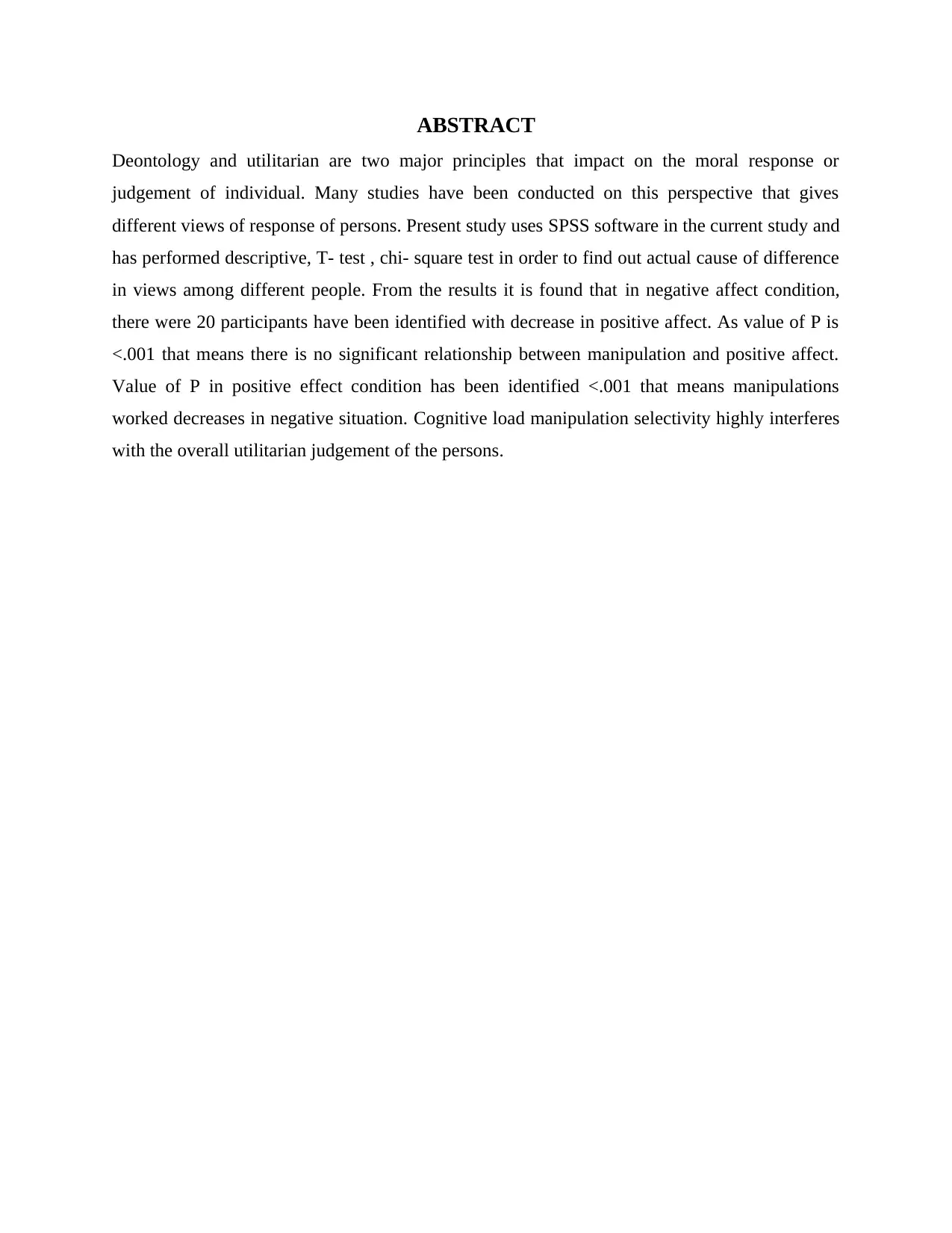
ABSTRACT
Deontology and utilitarian are two major principles that impact on the moral response or
judgement of individual. Many studies have been conducted on this perspective that gives
different views of response of persons. Present study uses SPSS software in the current study and
has performed descriptive, T- test , chi- square test in order to find out actual cause of difference
in views among different people. From the results it is found that in negative affect condition,
there were 20 participants have been identified with decrease in positive affect. As value of P is
<.001 that means there is no significant relationship between manipulation and positive affect.
Value of P in positive effect condition has been identified <.001 that means manipulations
worked decreases in negative situation. Cognitive load manipulation selectivity highly interferes
with the overall utilitarian judgement of the persons.
Deontology and utilitarian are two major principles that impact on the moral response or
judgement of individual. Many studies have been conducted on this perspective that gives
different views of response of persons. Present study uses SPSS software in the current study and
has performed descriptive, T- test , chi- square test in order to find out actual cause of difference
in views among different people. From the results it is found that in negative affect condition,
there were 20 participants have been identified with decrease in positive affect. As value of P is
<.001 that means there is no significant relationship between manipulation and positive affect.
Value of P in positive effect condition has been identified <.001 that means manipulations
worked decreases in negative situation. Cognitive load manipulation selectivity highly interferes
with the overall utilitarian judgement of the persons.
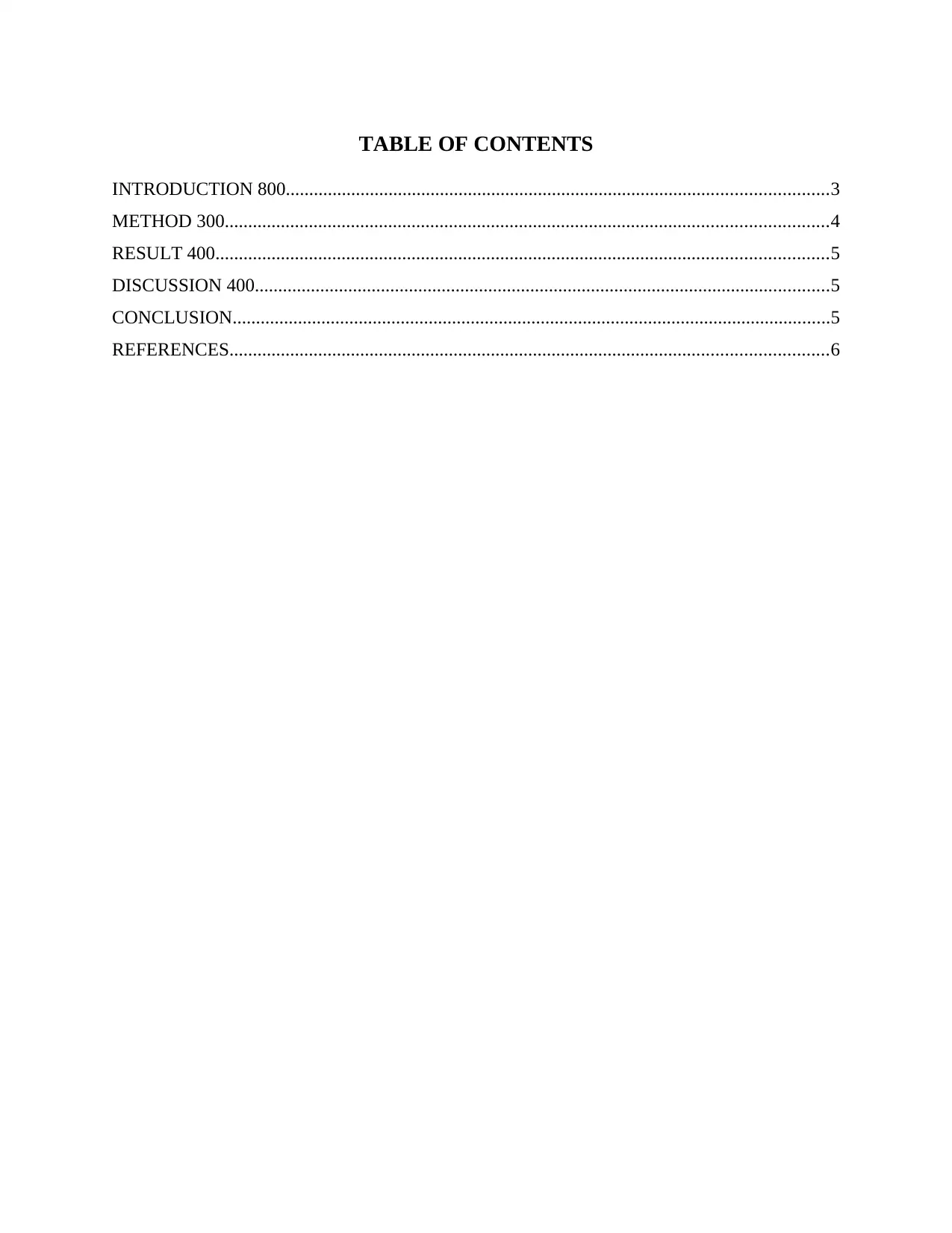
TABLE OF CONTENTS
INTRODUCTION 800....................................................................................................................3
METHOD 300.................................................................................................................................4
RESULT 400...................................................................................................................................5
DISCUSSION 400...........................................................................................................................5
CONCLUSION................................................................................................................................5
REFERENCES................................................................................................................................6
INTRODUCTION 800....................................................................................................................3
METHOD 300.................................................................................................................................4
RESULT 400...................................................................................................................................5
DISCUSSION 400...........................................................................................................................5
CONCLUSION................................................................................................................................5
REFERENCES................................................................................................................................6
⊘ This is a preview!⊘
Do you want full access?
Subscribe today to unlock all pages.

Trusted by 1+ million students worldwide
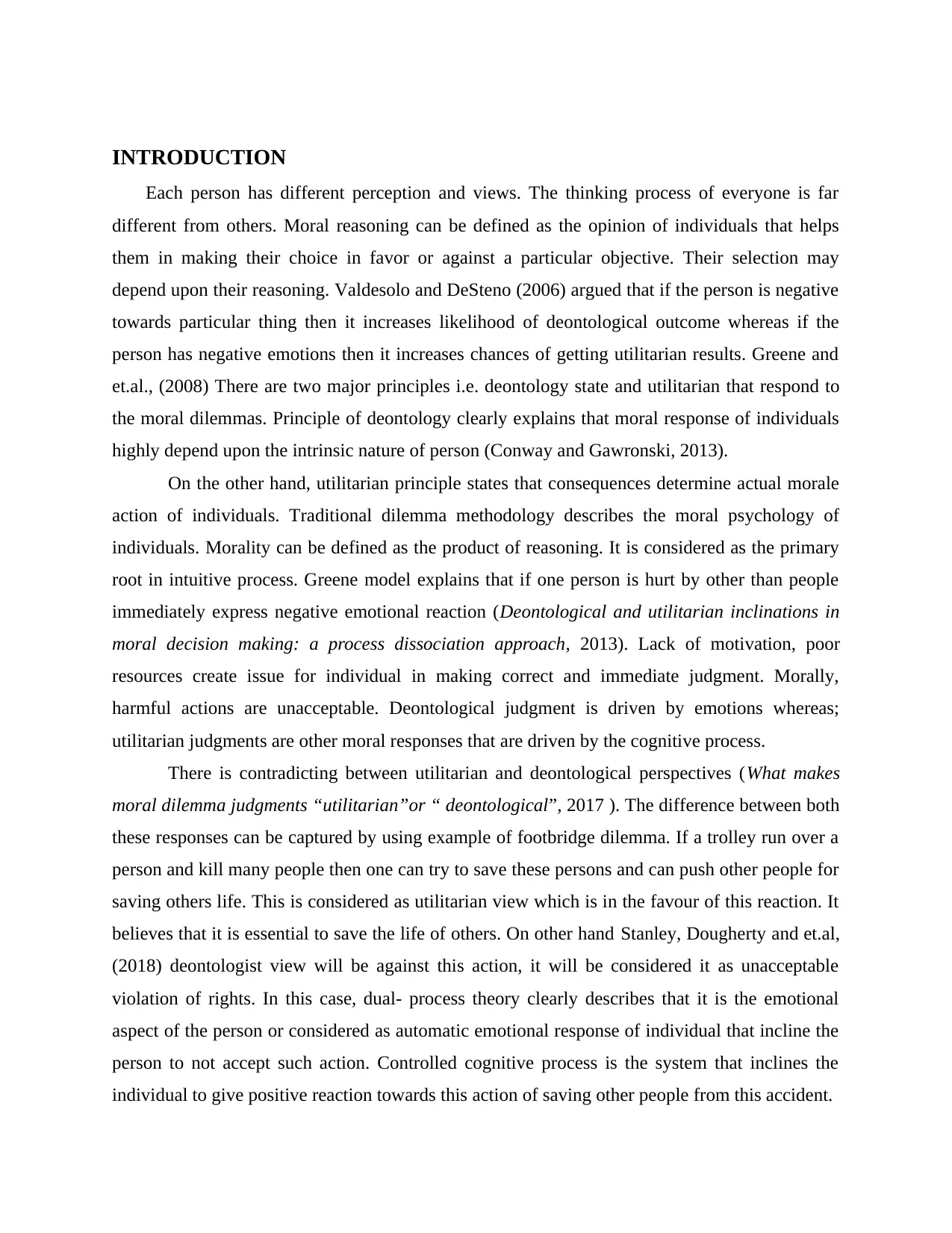
INTRODUCTION
Each person has different perception and views. The thinking process of everyone is far
different from others. Moral reasoning can be defined as the opinion of individuals that helps
them in making their choice in favor or against a particular objective. Their selection may
depend upon their reasoning. Valdesolo and DeSteno (2006) argued that if the person is negative
towards particular thing then it increases likelihood of deontological outcome whereas if the
person has negative emotions then it increases chances of getting utilitarian results. Greene and
et.al., (2008) There are two major principles i.e. deontology state and utilitarian that respond to
the moral dilemmas. Principle of deontology clearly explains that moral response of individuals
highly depend upon the intrinsic nature of person (Conway and Gawronski, 2013).
On the other hand, utilitarian principle states that consequences determine actual morale
action of individuals. Traditional dilemma methodology describes the moral psychology of
individuals. Morality can be defined as the product of reasoning. It is considered as the primary
root in intuitive process. Greene model explains that if one person is hurt by other than people
immediately express negative emotional reaction (Deontological and utilitarian inclinations in
moral decision making: a process dissociation approach, 2013). Lack of motivation, poor
resources create issue for individual in making correct and immediate judgment. Morally,
harmful actions are unacceptable. Deontological judgment is driven by emotions whereas;
utilitarian judgments are other moral responses that are driven by the cognitive process.
There is contradicting between utilitarian and deontological perspectives (What makes
moral dilemma judgments “utilitarian”or “ deontological”, 2017 ). The difference between both
these responses can be captured by using example of footbridge dilemma. If a trolley run over a
person and kill many people then one can try to save these persons and can push other people for
saving others life. This is considered as utilitarian view which is in the favour of this reaction. It
believes that it is essential to save the life of others. On other hand Stanley, Dougherty and et.al,
(2018) deontologist view will be against this action, it will be considered it as unacceptable
violation of rights. In this case, dual- process theory clearly describes that it is the emotional
aspect of the person or considered as automatic emotional response of individual that incline the
person to not accept such action. Controlled cognitive process is the system that inclines the
individual to give positive reaction towards this action of saving other people from this accident.
Each person has different perception and views. The thinking process of everyone is far
different from others. Moral reasoning can be defined as the opinion of individuals that helps
them in making their choice in favor or against a particular objective. Their selection may
depend upon their reasoning. Valdesolo and DeSteno (2006) argued that if the person is negative
towards particular thing then it increases likelihood of deontological outcome whereas if the
person has negative emotions then it increases chances of getting utilitarian results. Greene and
et.al., (2008) There are two major principles i.e. deontology state and utilitarian that respond to
the moral dilemmas. Principle of deontology clearly explains that moral response of individuals
highly depend upon the intrinsic nature of person (Conway and Gawronski, 2013).
On the other hand, utilitarian principle states that consequences determine actual morale
action of individuals. Traditional dilemma methodology describes the moral psychology of
individuals. Morality can be defined as the product of reasoning. It is considered as the primary
root in intuitive process. Greene model explains that if one person is hurt by other than people
immediately express negative emotional reaction (Deontological and utilitarian inclinations in
moral decision making: a process dissociation approach, 2013). Lack of motivation, poor
resources create issue for individual in making correct and immediate judgment. Morally,
harmful actions are unacceptable. Deontological judgment is driven by emotions whereas;
utilitarian judgments are other moral responses that are driven by the cognitive process.
There is contradicting between utilitarian and deontological perspectives (What makes
moral dilemma judgments “utilitarian”or “ deontological”, 2017 ). The difference between both
these responses can be captured by using example of footbridge dilemma. If a trolley run over a
person and kill many people then one can try to save these persons and can push other people for
saving others life. This is considered as utilitarian view which is in the favour of this reaction. It
believes that it is essential to save the life of others. On other hand Stanley, Dougherty and et.al,
(2018) deontologist view will be against this action, it will be considered it as unacceptable
violation of rights. In this case, dual- process theory clearly describes that it is the emotional
aspect of the person or considered as automatic emotional response of individual that incline the
person to not accept such action. Controlled cognitive process is the system that inclines the
individual to give positive reaction towards this action of saving other people from this accident.
Paraphrase This Document
Need a fresh take? Get an instant paraphrase of this document with our AI Paraphraser
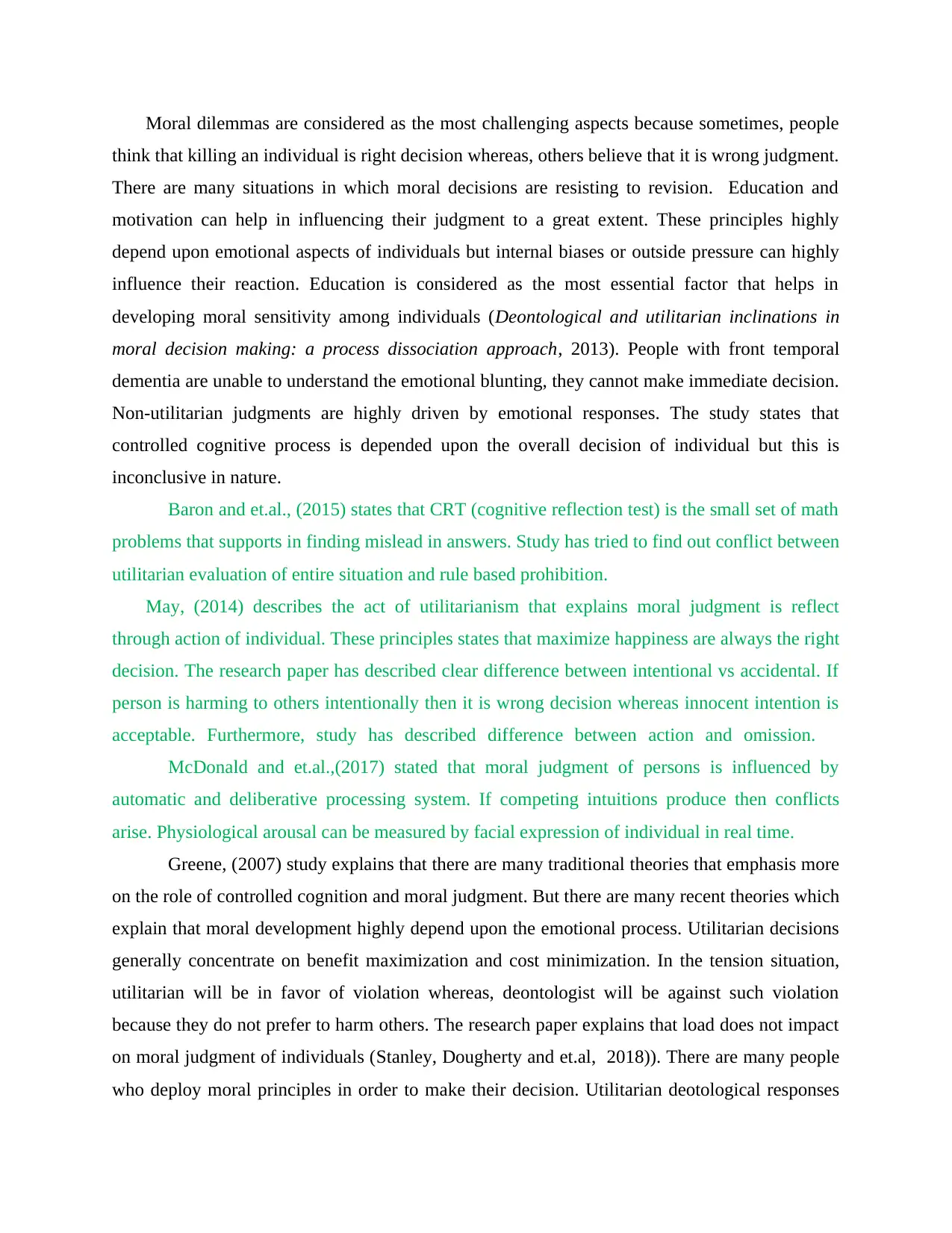
Moral dilemmas are considered as the most challenging aspects because sometimes, people
think that killing an individual is right decision whereas, others believe that it is wrong judgment.
There are many situations in which moral decisions are resisting to revision. Education and
motivation can help in influencing their judgment to a great extent. These principles highly
depend upon emotional aspects of individuals but internal biases or outside pressure can highly
influence their reaction. Education is considered as the most essential factor that helps in
developing moral sensitivity among individuals (Deontological and utilitarian inclinations in
moral decision making: a process dissociation approach, 2013). People with front temporal
dementia are unable to understand the emotional blunting, they cannot make immediate decision.
Non-utilitarian judgments are highly driven by emotional responses. The study states that
controlled cognitive process is depended upon the overall decision of individual but this is
inconclusive in nature.
Baron and et.al., (2015) states that CRT (cognitive reflection test) is the small set of math
problems that supports in finding mislead in answers. Study has tried to find out conflict between
utilitarian evaluation of entire situation and rule based prohibition.
May, (2014) describes the act of utilitarianism that explains moral judgment is reflect
through action of individual. These principles states that maximize happiness are always the right
decision. The research paper has described clear difference between intentional vs accidental. If
person is harming to others intentionally then it is wrong decision whereas innocent intention is
acceptable. Furthermore, study has described difference between action and omission.
McDonald and et.al.,(2017) stated that moral judgment of persons is influenced by
automatic and deliberative processing system. If competing intuitions produce then conflicts
arise. Physiological arousal can be measured by facial expression of individual in real time.
Greene, (2007) study explains that there are many traditional theories that emphasis more
on the role of controlled cognition and moral judgment. But there are many recent theories which
explain that moral development highly depend upon the emotional process. Utilitarian decisions
generally concentrate on benefit maximization and cost minimization. In the tension situation,
utilitarian will be in favor of violation whereas, deontologist will be against such violation
because they do not prefer to harm others. The research paper explains that load does not impact
on moral judgment of individuals (Stanley, Dougherty and et.al, 2018)). There are many people
who deploy moral principles in order to make their decision. Utilitarian deotological responses
think that killing an individual is right decision whereas, others believe that it is wrong judgment.
There are many situations in which moral decisions are resisting to revision. Education and
motivation can help in influencing their judgment to a great extent. These principles highly
depend upon emotional aspects of individuals but internal biases or outside pressure can highly
influence their reaction. Education is considered as the most essential factor that helps in
developing moral sensitivity among individuals (Deontological and utilitarian inclinations in
moral decision making: a process dissociation approach, 2013). People with front temporal
dementia are unable to understand the emotional blunting, they cannot make immediate decision.
Non-utilitarian judgments are highly driven by emotional responses. The study states that
controlled cognitive process is depended upon the overall decision of individual but this is
inconclusive in nature.
Baron and et.al., (2015) states that CRT (cognitive reflection test) is the small set of math
problems that supports in finding mislead in answers. Study has tried to find out conflict between
utilitarian evaluation of entire situation and rule based prohibition.
May, (2014) describes the act of utilitarianism that explains moral judgment is reflect
through action of individual. These principles states that maximize happiness are always the right
decision. The research paper has described clear difference between intentional vs accidental. If
person is harming to others intentionally then it is wrong decision whereas innocent intention is
acceptable. Furthermore, study has described difference between action and omission.
McDonald and et.al.,(2017) stated that moral judgment of persons is influenced by
automatic and deliberative processing system. If competing intuitions produce then conflicts
arise. Physiological arousal can be measured by facial expression of individual in real time.
Greene, (2007) study explains that there are many traditional theories that emphasis more
on the role of controlled cognition and moral judgment. But there are many recent theories which
explain that moral development highly depend upon the emotional process. Utilitarian decisions
generally concentrate on benefit maximization and cost minimization. In the tension situation,
utilitarian will be in favor of violation whereas, deontologist will be against such violation
because they do not prefer to harm others. The research paper explains that load does not impact
on moral judgment of individuals (Stanley, Dougherty and et.al, 2018)). There are many people
who deploy moral principles in order to make their decision. Utilitarian deotological responses
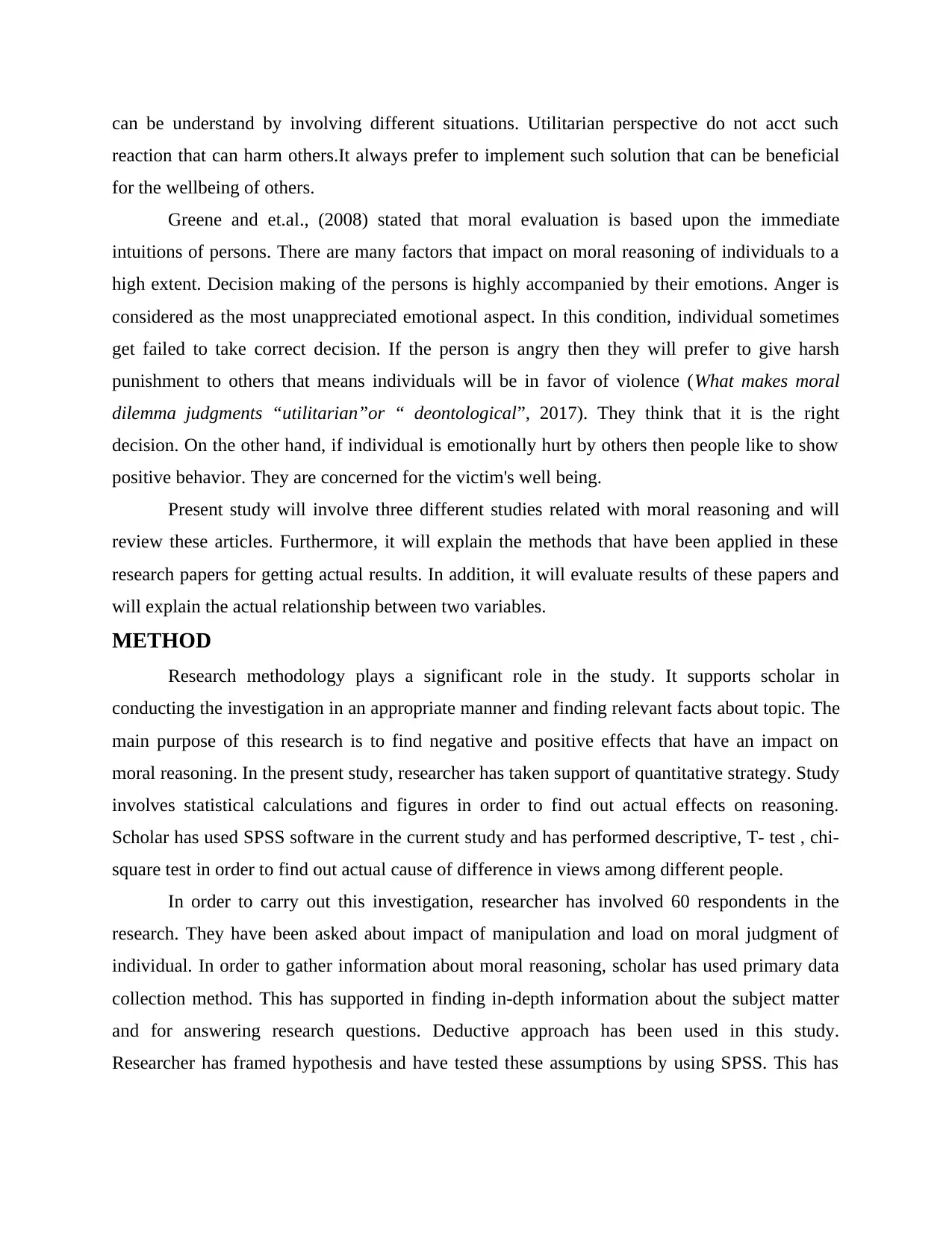
can be understand by involving different situations. Utilitarian perspective do not acct such
reaction that can harm others.It always prefer to implement such solution that can be beneficial
for the wellbeing of others.
Greene and et.al., (2008) stated that moral evaluation is based upon the immediate
intuitions of persons. There are many factors that impact on moral reasoning of individuals to a
high extent. Decision making of the persons is highly accompanied by their emotions. Anger is
considered as the most unappreciated emotional aspect. In this condition, individual sometimes
get failed to take correct decision. If the person is angry then they will prefer to give harsh
punishment to others that means individuals will be in favor of violence (What makes moral
dilemma judgments “utilitarian”or “ deontological”, 2017). They think that it is the right
decision. On the other hand, if individual is emotionally hurt by others then people like to show
positive behavior. They are concerned for the victim's well being.
Present study will involve three different studies related with moral reasoning and will
review these articles. Furthermore, it will explain the methods that have been applied in these
research papers for getting actual results. In addition, it will evaluate results of these papers and
will explain the actual relationship between two variables.
METHOD
Research methodology plays a significant role in the study. It supports scholar in
conducting the investigation in an appropriate manner and finding relevant facts about topic. The
main purpose of this research is to find negative and positive effects that have an impact on
moral reasoning. In the present study, researcher has taken support of quantitative strategy. Study
involves statistical calculations and figures in order to find out actual effects on reasoning.
Scholar has used SPSS software in the current study and has performed descriptive, T- test , chi-
square test in order to find out actual cause of difference in views among different people.
In order to carry out this investigation, researcher has involved 60 respondents in the
research. They have been asked about impact of manipulation and load on moral judgment of
individual. In order to gather information about moral reasoning, scholar has used primary data
collection method. This has supported in finding in-depth information about the subject matter
and for answering research questions. Deductive approach has been used in this study.
Researcher has framed hypothesis and have tested these assumptions by using SPSS. This has
reaction that can harm others.It always prefer to implement such solution that can be beneficial
for the wellbeing of others.
Greene and et.al., (2008) stated that moral evaluation is based upon the immediate
intuitions of persons. There are many factors that impact on moral reasoning of individuals to a
high extent. Decision making of the persons is highly accompanied by their emotions. Anger is
considered as the most unappreciated emotional aspect. In this condition, individual sometimes
get failed to take correct decision. If the person is angry then they will prefer to give harsh
punishment to others that means individuals will be in favor of violence (What makes moral
dilemma judgments “utilitarian”or “ deontological”, 2017). They think that it is the right
decision. On the other hand, if individual is emotionally hurt by others then people like to show
positive behavior. They are concerned for the victim's well being.
Present study will involve three different studies related with moral reasoning and will
review these articles. Furthermore, it will explain the methods that have been applied in these
research papers for getting actual results. In addition, it will evaluate results of these papers and
will explain the actual relationship between two variables.
METHOD
Research methodology plays a significant role in the study. It supports scholar in
conducting the investigation in an appropriate manner and finding relevant facts about topic. The
main purpose of this research is to find negative and positive effects that have an impact on
moral reasoning. In the present study, researcher has taken support of quantitative strategy. Study
involves statistical calculations and figures in order to find out actual effects on reasoning.
Scholar has used SPSS software in the current study and has performed descriptive, T- test , chi-
square test in order to find out actual cause of difference in views among different people.
In order to carry out this investigation, researcher has involved 60 respondents in the
research. They have been asked about impact of manipulation and load on moral judgment of
individual. In order to gather information about moral reasoning, scholar has used primary data
collection method. This has supported in finding in-depth information about the subject matter
and for answering research questions. Deductive approach has been used in this study.
Researcher has framed hypothesis and have tested these assumptions by using SPSS. This has
⊘ This is a preview!⊘
Do you want full access?
Subscribe today to unlock all pages.

Trusted by 1+ million students worldwide
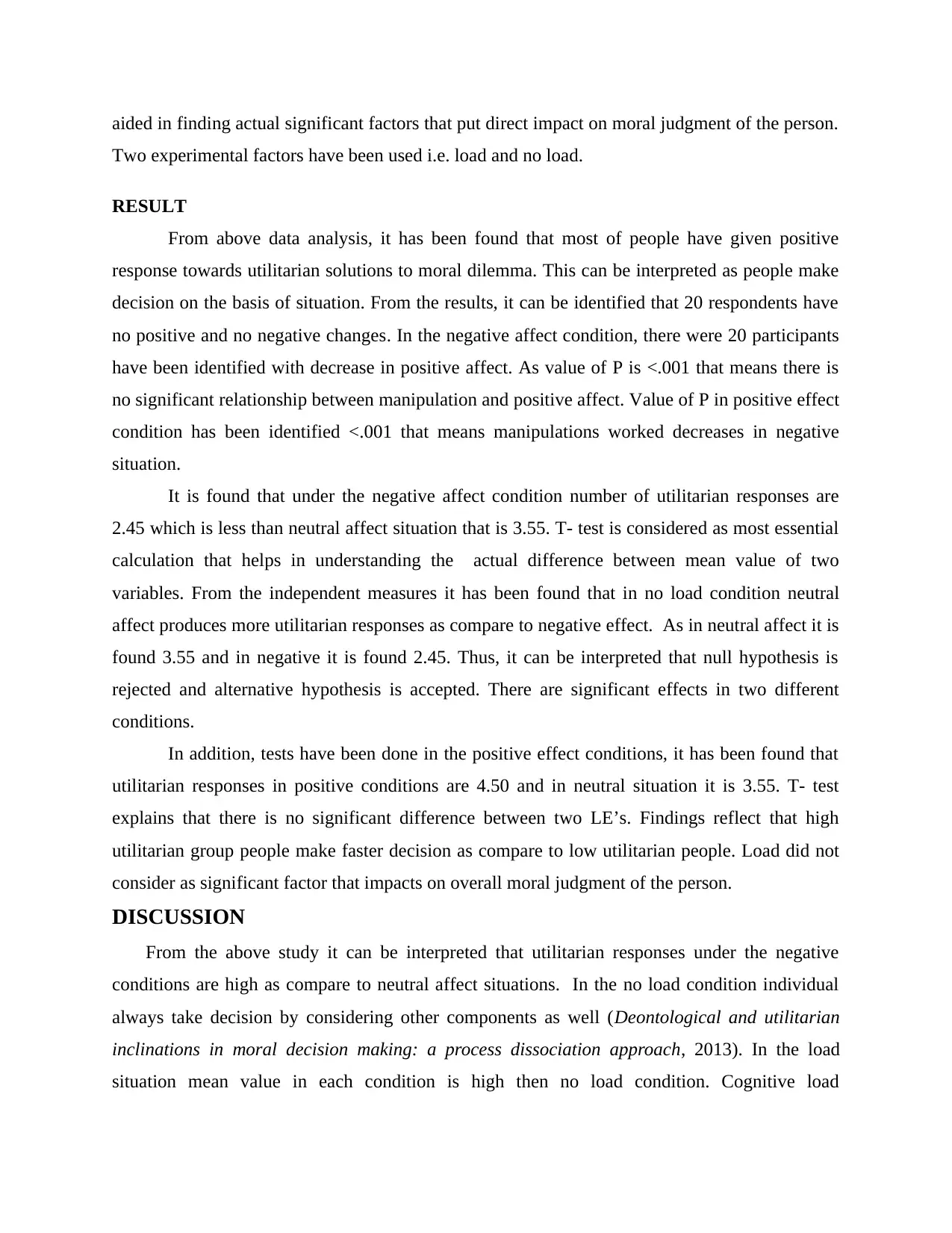
aided in finding actual significant factors that put direct impact on moral judgment of the person.
Two experimental factors have been used i.e. load and no load.
RESULT
From above data analysis, it has been found that most of people have given positive
response towards utilitarian solutions to moral dilemma. This can be interpreted as people make
decision on the basis of situation. From the results, it can be identified that 20 respondents have
no positive and no negative changes. In the negative affect condition, there were 20 participants
have been identified with decrease in positive affect. As value of P is <.001 that means there is
no significant relationship between manipulation and positive affect. Value of P in positive effect
condition has been identified <.001 that means manipulations worked decreases in negative
situation.
It is found that under the negative affect condition number of utilitarian responses are
2.45 which is less than neutral affect situation that is 3.55. T- test is considered as most essential
calculation that helps in understanding the actual difference between mean value of two
variables. From the independent measures it has been found that in no load condition neutral
affect produces more utilitarian responses as compare to negative effect. As in neutral affect it is
found 3.55 and in negative it is found 2.45. Thus, it can be interpreted that null hypothesis is
rejected and alternative hypothesis is accepted. There are significant effects in two different
conditions.
In addition, tests have been done in the positive effect conditions, it has been found that
utilitarian responses in positive conditions are 4.50 and in neutral situation it is 3.55. T- test
explains that there is no significant difference between two LE’s. Findings reflect that high
utilitarian group people make faster decision as compare to low utilitarian people. Load did not
consider as significant factor that impacts on overall moral judgment of the person.
DISCUSSION
From the above study it can be interpreted that utilitarian responses under the negative
conditions are high as compare to neutral affect situations. In the no load condition individual
always take decision by considering other components as well (Deontological and utilitarian
inclinations in moral decision making: a process dissociation approach, 2013). In the load
situation mean value in each condition is high then no load condition. Cognitive load
Two experimental factors have been used i.e. load and no load.
RESULT
From above data analysis, it has been found that most of people have given positive
response towards utilitarian solutions to moral dilemma. This can be interpreted as people make
decision on the basis of situation. From the results, it can be identified that 20 respondents have
no positive and no negative changes. In the negative affect condition, there were 20 participants
have been identified with decrease in positive affect. As value of P is <.001 that means there is
no significant relationship between manipulation and positive affect. Value of P in positive effect
condition has been identified <.001 that means manipulations worked decreases in negative
situation.
It is found that under the negative affect condition number of utilitarian responses are
2.45 which is less than neutral affect situation that is 3.55. T- test is considered as most essential
calculation that helps in understanding the actual difference between mean value of two
variables. From the independent measures it has been found that in no load condition neutral
affect produces more utilitarian responses as compare to negative effect. As in neutral affect it is
found 3.55 and in negative it is found 2.45. Thus, it can be interpreted that null hypothesis is
rejected and alternative hypothesis is accepted. There are significant effects in two different
conditions.
In addition, tests have been done in the positive effect conditions, it has been found that
utilitarian responses in positive conditions are 4.50 and in neutral situation it is 3.55. T- test
explains that there is no significant difference between two LE’s. Findings reflect that high
utilitarian group people make faster decision as compare to low utilitarian people. Load did not
consider as significant factor that impacts on overall moral judgment of the person.
DISCUSSION
From the above study it can be interpreted that utilitarian responses under the negative
conditions are high as compare to neutral affect situations. In the no load condition individual
always take decision by considering other components as well (Deontological and utilitarian
inclinations in moral decision making: a process dissociation approach, 2013). In the load
situation mean value in each condition is high then no load condition. Cognitive load
Paraphrase This Document
Need a fresh take? Get an instant paraphrase of this document with our AI Paraphraser
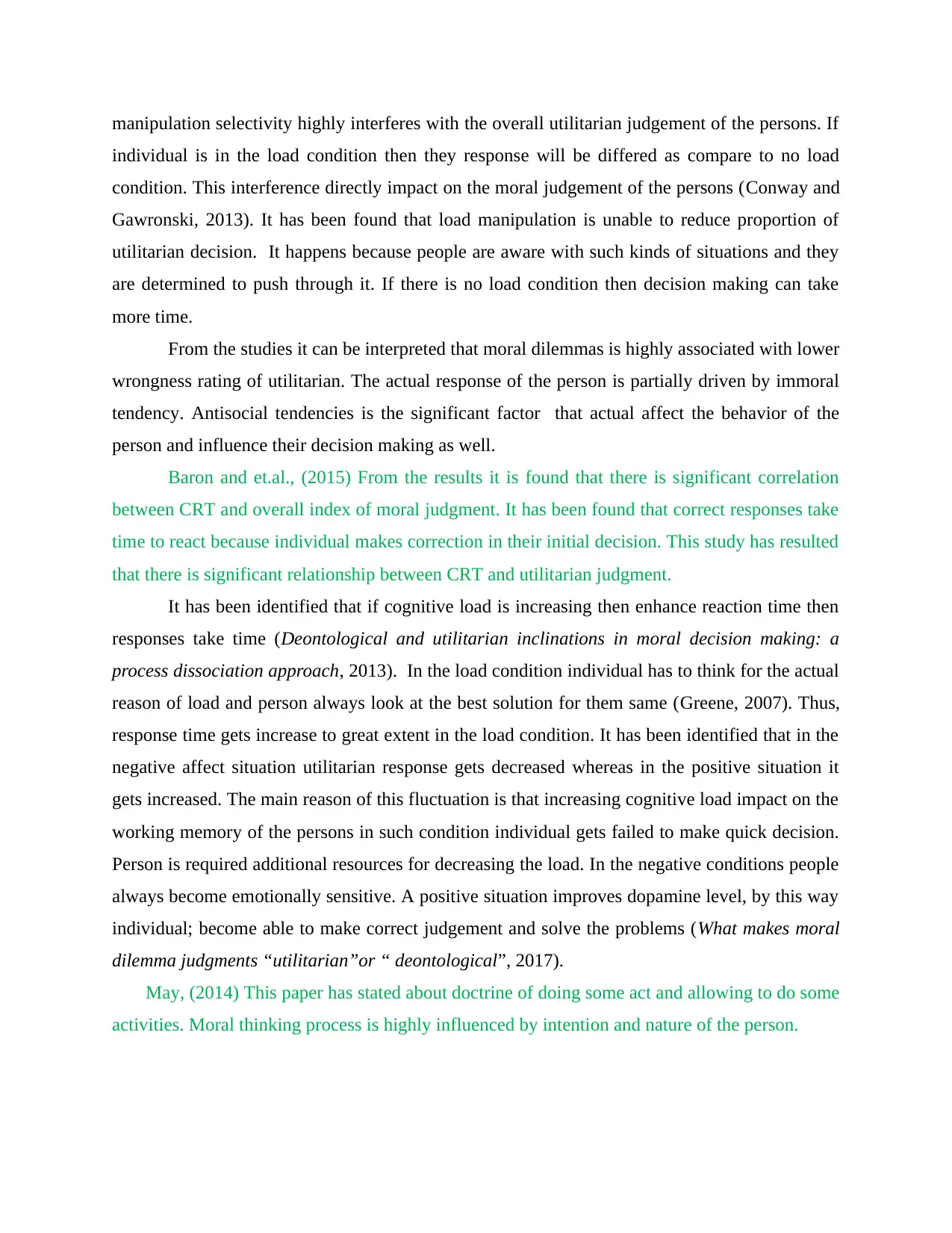
manipulation selectivity highly interferes with the overall utilitarian judgement of the persons. If
individual is in the load condition then they response will be differed as compare to no load
condition. This interference directly impact on the moral judgement of the persons (Conway and
Gawronski, 2013). It has been found that load manipulation is unable to reduce proportion of
utilitarian decision. It happens because people are aware with such kinds of situations and they
are determined to push through it. If there is no load condition then decision making can take
more time.
From the studies it can be interpreted that moral dilemmas is highly associated with lower
wrongness rating of utilitarian. The actual response of the person is partially driven by immoral
tendency. Antisocial tendencies is the significant factor that actual affect the behavior of the
person and influence their decision making as well.
Baron and et.al., (2015) From the results it is found that there is significant correlation
between CRT and overall index of moral judgment. It has been found that correct responses take
time to react because individual makes correction in their initial decision. This study has resulted
that there is significant relationship between CRT and utilitarian judgment.
It has been identified that if cognitive load is increasing then enhance reaction time then
responses take time (Deontological and utilitarian inclinations in moral decision making: a
process dissociation approach, 2013). In the load condition individual has to think for the actual
reason of load and person always look at the best solution for them same (Greene, 2007). Thus,
response time gets increase to great extent in the load condition. It has been identified that in the
negative affect situation utilitarian response gets decreased whereas in the positive situation it
gets increased. The main reason of this fluctuation is that increasing cognitive load impact on the
working memory of the persons in such condition individual gets failed to make quick decision.
Person is required additional resources for decreasing the load. In the negative conditions people
always become emotionally sensitive. A positive situation improves dopamine level, by this way
individual; become able to make correct judgement and solve the problems (What makes moral
dilemma judgments “utilitarian”or “ deontological”, 2017).
May, (2014) This paper has stated about doctrine of doing some act and allowing to do some
activities. Moral thinking process is highly influenced by intention and nature of the person.
individual is in the load condition then they response will be differed as compare to no load
condition. This interference directly impact on the moral judgement of the persons (Conway and
Gawronski, 2013). It has been found that load manipulation is unable to reduce proportion of
utilitarian decision. It happens because people are aware with such kinds of situations and they
are determined to push through it. If there is no load condition then decision making can take
more time.
From the studies it can be interpreted that moral dilemmas is highly associated with lower
wrongness rating of utilitarian. The actual response of the person is partially driven by immoral
tendency. Antisocial tendencies is the significant factor that actual affect the behavior of the
person and influence their decision making as well.
Baron and et.al., (2015) From the results it is found that there is significant correlation
between CRT and overall index of moral judgment. It has been found that correct responses take
time to react because individual makes correction in their initial decision. This study has resulted
that there is significant relationship between CRT and utilitarian judgment.
It has been identified that if cognitive load is increasing then enhance reaction time then
responses take time (Deontological and utilitarian inclinations in moral decision making: a
process dissociation approach, 2013). In the load condition individual has to think for the actual
reason of load and person always look at the best solution for them same (Greene, 2007). Thus,
response time gets increase to great extent in the load condition. It has been identified that in the
negative affect situation utilitarian response gets decreased whereas in the positive situation it
gets increased. The main reason of this fluctuation is that increasing cognitive load impact on the
working memory of the persons in such condition individual gets failed to make quick decision.
Person is required additional resources for decreasing the load. In the negative conditions people
always become emotionally sensitive. A positive situation improves dopamine level, by this way
individual; become able to make correct judgement and solve the problems (What makes moral
dilemma judgments “utilitarian”or “ deontological”, 2017).
May, (2014) This paper has stated about doctrine of doing some act and allowing to do some
activities. Moral thinking process is highly influenced by intention and nature of the person.
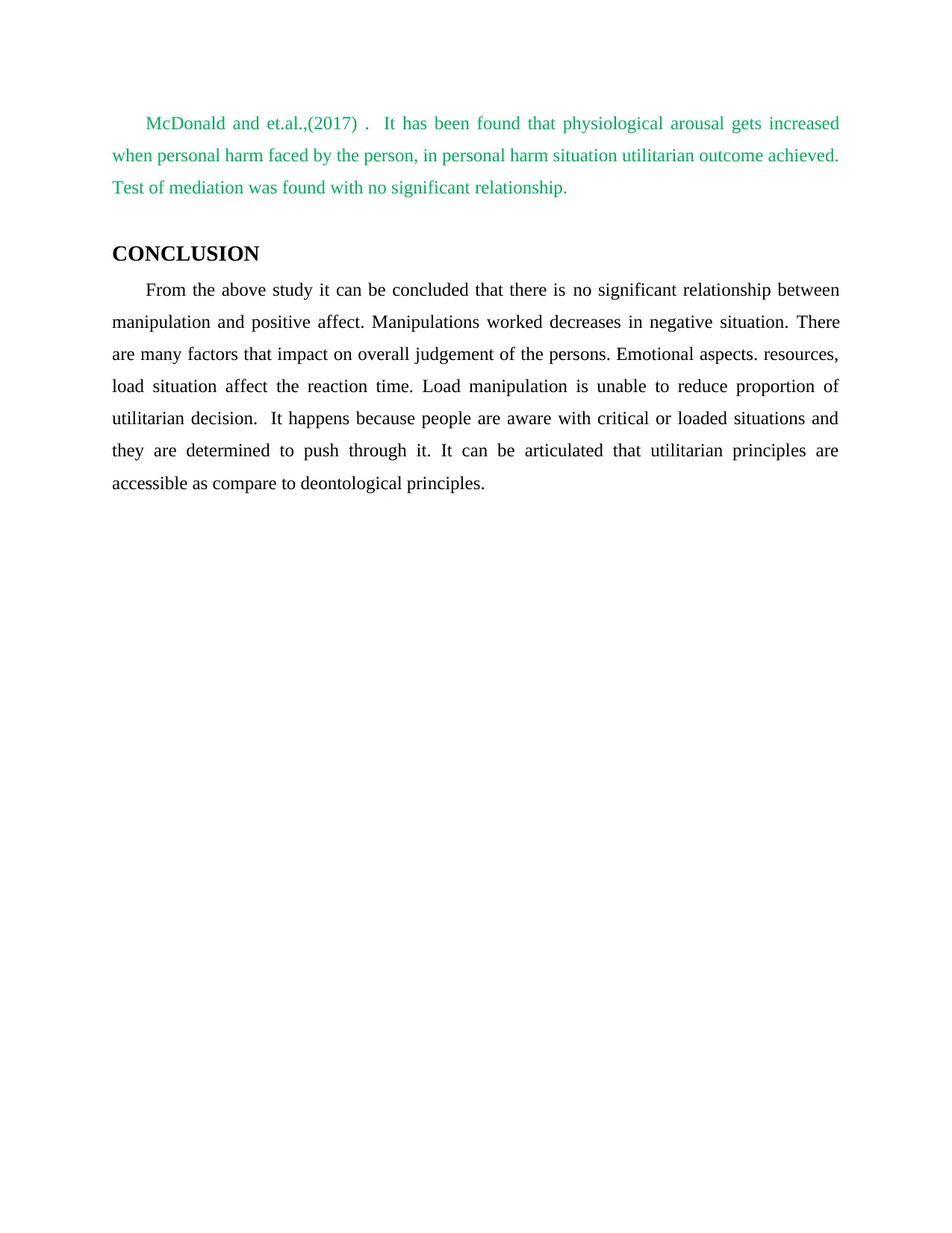
McDonald and et.al.,(2017) . It has been found that physiological arousal gets increased
when personal harm faced by the person, in personal harm situation utilitarian outcome achieved.
Test of mediation was found with no significant relationship.
CONCLUSION
From the above study it can be concluded that there is no significant relationship between
manipulation and positive affect. Manipulations worked decreases in negative situation. There
are many factors that impact on overall judgement of the persons. Emotional aspects. resources,
load situation affect the reaction time. Load manipulation is unable to reduce proportion of
utilitarian decision. It happens because people are aware with critical or loaded situations and
they are determined to push through it. It can be articulated that utilitarian principles are
accessible as compare to deontological principles.
when personal harm faced by the person, in personal harm situation utilitarian outcome achieved.
Test of mediation was found with no significant relationship.
CONCLUSION
From the above study it can be concluded that there is no significant relationship between
manipulation and positive affect. Manipulations worked decreases in negative situation. There
are many factors that impact on overall judgement of the persons. Emotional aspects. resources,
load situation affect the reaction time. Load manipulation is unable to reduce proportion of
utilitarian decision. It happens because people are aware with critical or loaded situations and
they are determined to push through it. It can be articulated that utilitarian principles are
accessible as compare to deontological principles.
⊘ This is a preview!⊘
Do you want full access?
Subscribe today to unlock all pages.

Trusted by 1+ million students worldwide
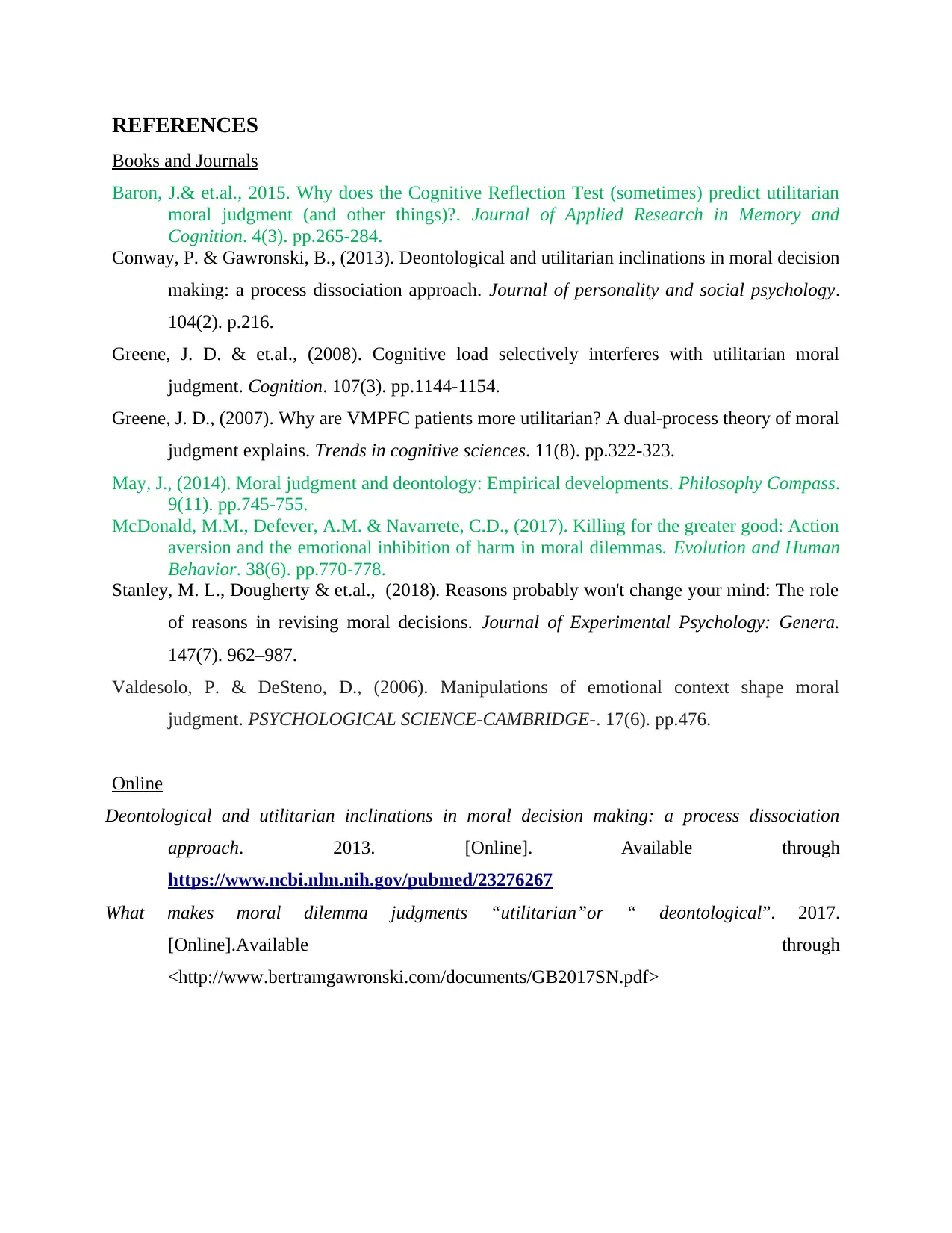
REFERENCES
Books and Journals
Baron, J.& et.al., 2015. Why does the Cognitive Reflection Test (sometimes) predict utilitarian
moral judgment (and other things)?. Journal of Applied Research in Memory and
Cognition. 4(3). pp.265-284.
Conway, P. & Gawronski, B., (2013). Deontological and utilitarian inclinations in moral decision
making: a process dissociation approach. Journal of personality and social psychology.
104(2). p.216.
Greene, J. D. & et.al., (2008). Cognitive load selectively interferes with utilitarian moral
judgment. Cognition. 107(3). pp.1144-1154.
Greene, J. D., (2007). Why are VMPFC patients more utilitarian? A dual-process theory of moral
judgment explains. Trends in cognitive sciences. 11(8). pp.322-323.
May, J., (2014). Moral judgment and deontology: Empirical developments. Philosophy Compass.
9(11). pp.745-755.
McDonald, M.M., Defever, A.M. & Navarrete, C.D., (2017). Killing for the greater good: Action
aversion and the emotional inhibition of harm in moral dilemmas. Evolution and Human
Behavior. 38(6). pp.770-778.
Stanley, M. L., Dougherty & et.al., (2018). Reasons probably won't change your mind: The role
of reasons in revising moral decisions. Journal of Experimental Psychology: Genera.
147(7). 962–987.
Valdesolo, P. & DeSteno, D., (2006). Manipulations of emotional context shape moral
judgment. PSYCHOLOGICAL SCIENCE-CAMBRIDGE-. 17(6). pp.476.
Online
Deontological and utilitarian inclinations in moral decision making: a process dissociation
approach. 2013. [Online]. Available through
https://www.ncbi.nlm.nih.gov/pubmed/23276267
What makes moral dilemma judgments “utilitarian”or “ deontological”. 2017.
[Online].Available through
<http://www.bertramgawronski.com/documents/GB2017SN.pdf>
Books and Journals
Baron, J.& et.al., 2015. Why does the Cognitive Reflection Test (sometimes) predict utilitarian
moral judgment (and other things)?. Journal of Applied Research in Memory and
Cognition. 4(3). pp.265-284.
Conway, P. & Gawronski, B., (2013). Deontological and utilitarian inclinations in moral decision
making: a process dissociation approach. Journal of personality and social psychology.
104(2). p.216.
Greene, J. D. & et.al., (2008). Cognitive load selectively interferes with utilitarian moral
judgment. Cognition. 107(3). pp.1144-1154.
Greene, J. D., (2007). Why are VMPFC patients more utilitarian? A dual-process theory of moral
judgment explains. Trends in cognitive sciences. 11(8). pp.322-323.
May, J., (2014). Moral judgment and deontology: Empirical developments. Philosophy Compass.
9(11). pp.745-755.
McDonald, M.M., Defever, A.M. & Navarrete, C.D., (2017). Killing for the greater good: Action
aversion and the emotional inhibition of harm in moral dilemmas. Evolution and Human
Behavior. 38(6). pp.770-778.
Stanley, M. L., Dougherty & et.al., (2018). Reasons probably won't change your mind: The role
of reasons in revising moral decisions. Journal of Experimental Psychology: Genera.
147(7). 962–987.
Valdesolo, P. & DeSteno, D., (2006). Manipulations of emotional context shape moral
judgment. PSYCHOLOGICAL SCIENCE-CAMBRIDGE-. 17(6). pp.476.
Online
Deontological and utilitarian inclinations in moral decision making: a process dissociation
approach. 2013. [Online]. Available through
https://www.ncbi.nlm.nih.gov/pubmed/23276267
What makes moral dilemma judgments “utilitarian”or “ deontological”. 2017.
[Online].Available through
<http://www.bertramgawronski.com/documents/GB2017SN.pdf>
Paraphrase This Document
Need a fresh take? Get an instant paraphrase of this document with our AI Paraphraser
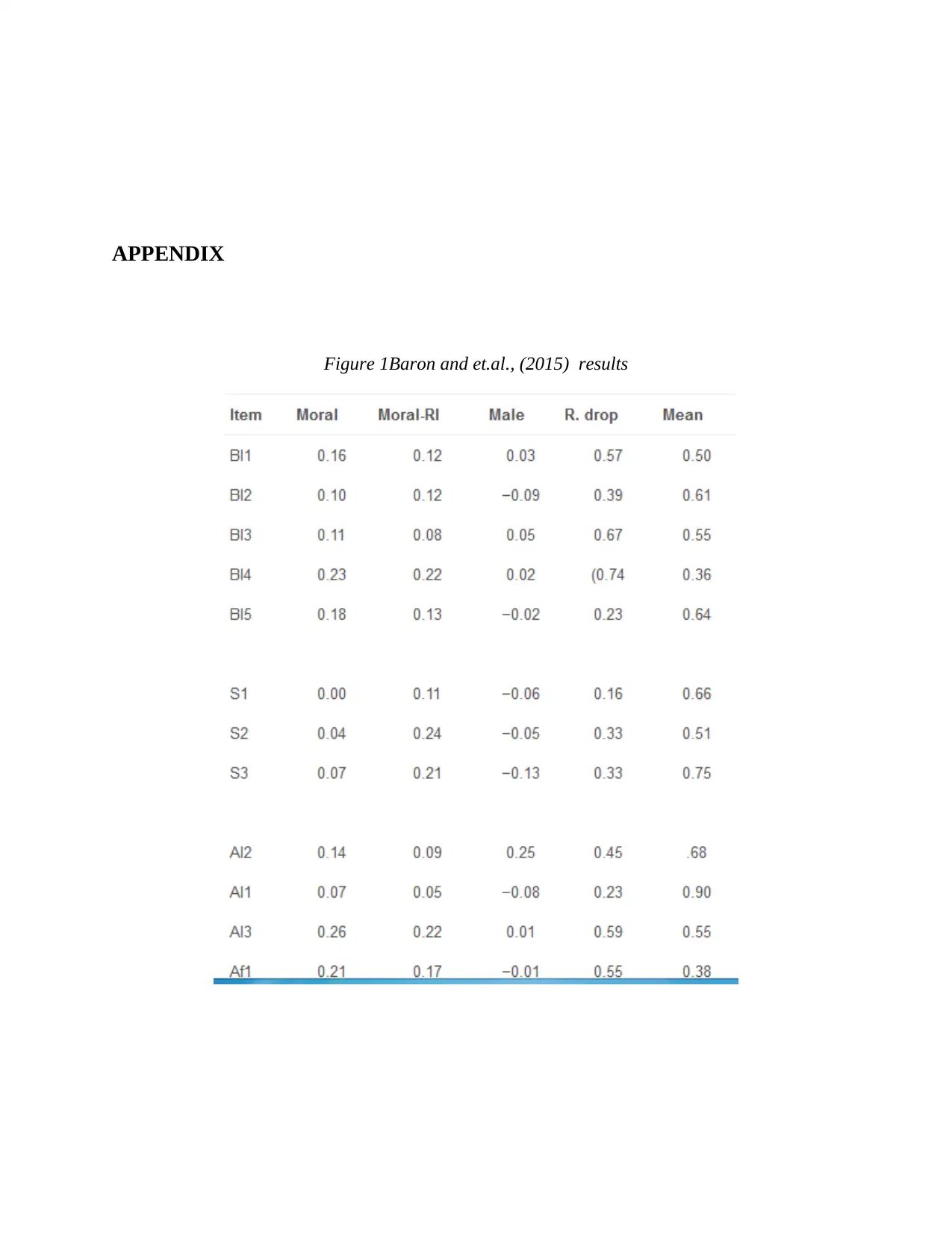
APPENDIX
Figure 1Baron and et.al., (2015) results
Figure 1Baron and et.al., (2015) results
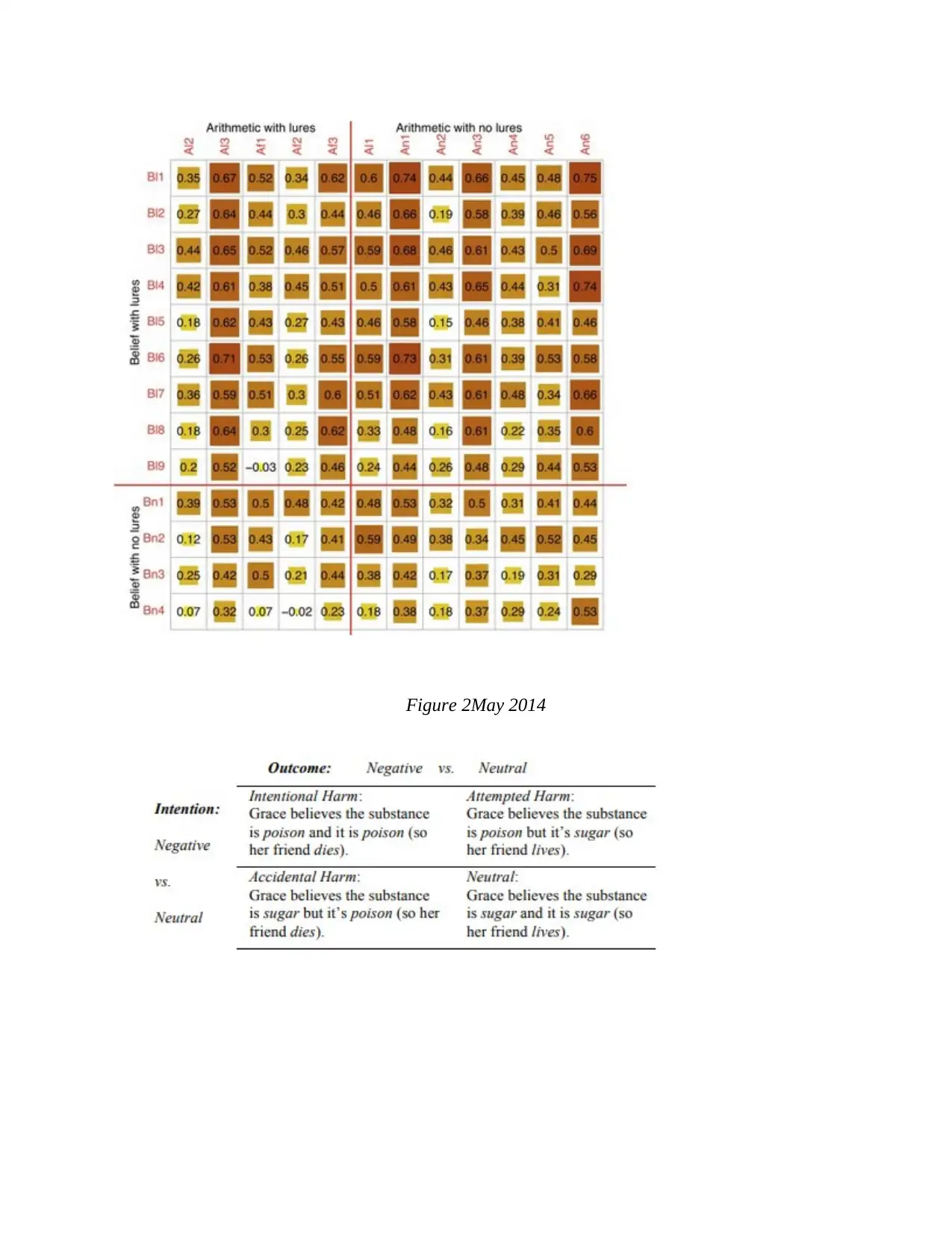
Figure 2May 2014
⊘ This is a preview!⊘
Do you want full access?
Subscribe today to unlock all pages.

Trusted by 1+ million students worldwide
1 out of 12
Your All-in-One AI-Powered Toolkit for Academic Success.
+13062052269
info@desklib.com
Available 24*7 on WhatsApp / Email
![[object Object]](/_next/static/media/star-bottom.7253800d.svg)
Unlock your academic potential
Copyright © 2020–2026 A2Z Services. All Rights Reserved. Developed and managed by ZUCOL.


